Related Research Articles

Raid is a 1947 German crime film directed by Werner Klingler and starring Paul Bildt, Agathe Poschmann, and Claus Holm. It was made as a cautionary tale about the black market in postwar Berlin.

The Marriage of Figaro is a 1949 East German musical film directed by Georg Wildhagen and starring Angelika Hauff, Willi Domgraf-Fassbaender and Sabine Peters. It was based on the opera The Marriage of Figaro by Wolfgang Amadeus Mozart and Lorenzo Da Ponte, which was itself based on the play The Marriage of Figaro by Pierre Beaumarchais. The film was made by DEFA, the state production company of East Germany, in their Babelsberg Studio and the nearby Babelsberg Park. It sold 5,479,427 tickets.
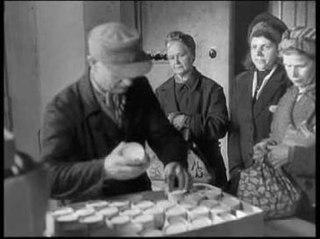
Der Weg nach oben is an East German political and economic documentary film directed by Andrew Thorndike. It was released in 1950, premiering on the eve of the first anniversary of the German Democratic Republic. Critically acclaimed, it won the Best Documentary Film at the Karlovy Vary International Film Festival in 1951. The film was produced by DEFA Studio für Wochenschau und Dokumentarfilme. This was Thorndike's first feature-length film.
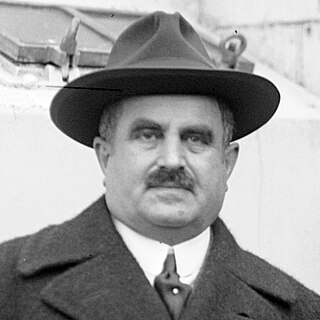
Paul Davidson was a German film producer.

Child of the Danube is a 1950 Austrian musical film directed by Georg Jacoby and starring Marika Rökk, Fred Liewehr and Harry Fuß. It was one of a cycle of popular musicals made by Jacoby and Rökk.
Berolina Film was a film production company which operated in West Germany between 1948 and 1964. The film's production was supervised by the experienced Kurt Ulrich and was based in West Berlin. The company helped launch a cycle of popular heimatfilm made in the 1950s.
The Projektions-AG Union was a German film production company which operated between 1911 and 1924 during the silent era. From 1917 onwards the company functioned as an independent unit of Universum Film AG, and was eventually merged into it entirely.
The Tunnel is a 1915 German silent drama film directed by William Wauer and starring Friedrich Kayßler, Fritzi Massary and Hermann Vallentin. It is the first of several film adaptations of Bernhard Kellermann's 1913 novel Der Tunnel about the construction of a vast tunnel under the Atlantic Ocean connecting Europe and America. The film was made by Paul Davidson's PAGU production company, with sets designed by art director Hermann Warm.

The Orplid Mystery or Epilogue is a 1950 West German thriller film directed by Helmut Käutner and starring Horst Caspar, Bettina Moissi, and O.E. Hasse. The film did not perform well at the box office on its release.

Hello, Fraulein! is a 1949 German musical film directed by Rudolf Jugert and starring Margot Hielscher, Hans Söhnker and Peter van Eyck. It was made by the Munich-based company Bavaria Film in what would shortly become West Germany. It marked the German debut of van Eyck who had actually been born in Pomerania but had spent many years in the United States, leading him to be promoted in the film's publicity as an American actor.
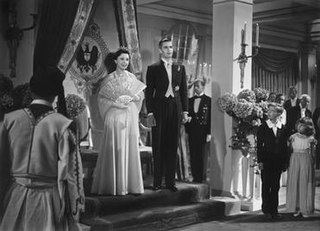
Royal Children is a 1950 West German comedy film directed by Helmut Käutner and starring Jenny Jugo, Peter van Eyck and Hedwig Wangel.
Don Juan is a 1955 Austrian musical film directed by Walter Kolm-Veltée and starring Cesare Danova, Josef Meinrad and Evelyn Cormand. It is an adaptation of the 1787 Mozart opera Don Giovanni.

Two Times Lotte is a 1950 West German film, directed by Josef von Báky and starring Antje Weisgerber, Peter Mosbacher, Jutta Günther and Isa Günther.

Doctor Crippen Lives is a 1958 West German crime film directed by Erich Engels and starring Elisabeth Müller, Peter van Eyck and Fritz Tillmann. It was made at the Wandsbek Studios of Real Film in Hamburg. The film's sets were designed by the art director Dieter Bartels.

When the Heath Is in Bloom is a 1960 West German drama film directed by Hans Deppe and starring Joachim Hansen, Walter Richter, and Peter Carsten.
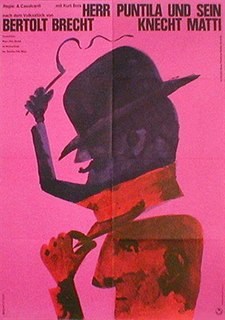
Herr Puntila and His Servant Matti is a 1960 Austrian comedy film directed by Alberto Cavalcanti and starring Curt Bois, Heinz Engelmann and Maria Emo. It was made at the Soviet-controlled Rosenhügel Studios in Vienna. Production began in 1955, but wasn't completed until 1960. The film is based on the 1948 play of the same name by Bertolt Brecht.
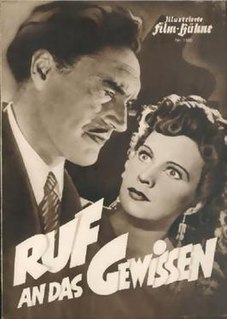
The Appeal to Conscience is a 1949 German mystery film directed by Karl Anton and starring Karl Ludwig Diehl, Werner Hinz and Gustav Diessl. It was originally shot in 1944, but remained uncompleted until it was finished by DEFA in the post-war era. It remained unreleased until it was given a 1949 premiere in Austria. Subsequently it was distributed in East Germany in 1950 and West Germany in 1951.
Alarm is a 1941 German crime film directed by Herbert B. Fredersdorf and starring Karl Martell, Maria von Tasnady and Paul Klinger.
The Wandsbek Studios are film production and television studios located in Wandsbek, a district of the German city of Hamburg.
Capitol Film was a West German film production company active between 1953 and 1956 established by Arno Hauke. The company was able to utilise the assets of the former UFA company, now being held in a trust of which Hauke was an accountant and director. With the trust's funds Hauke had also acquired a distribution company Prisma Film to release Capitol's films.
References
- ↑ Davidson & Hake p.196